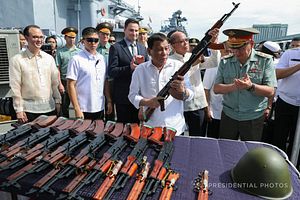Last week, Philippine Defense Secretary Delfin Lorenzana provided some additional specifics on aspects of ongoing maritime cooperation between Russia and the Philippines. Though his comments only covered a couple of areas within that collaboration and did not include many specifics, they nonetheless provided some insights into where Manila and Moscow are in this aspect of their broader relationship.
As I have been noting in these pages, as a consequence of Philippine President Rodrigo Duterte’s so-called independent foreign policy which seeks to boost the country’s outreach with countries like China and Russia, we have seen Russia-Philippine defense ties strengthen slowly but surely despite the clear limits that still exist (See: “Where Are Russia-Philippines Defense Relations Under Duterte?”).
As this has unfolded, we have seen some developments with respect to maritime ties as well. Some of this has been tied to wider defense collaboration, such as the inking of a new military pact during Duterte’s visit to Russia in June 2017, while some of it has been more specific to the naval realm, such as multiple visits by Russian vessels to the Philippines.
Both sides have continued to discuss future possibilities for advancing this aspect of ties in 2018. Maritime cooperation has factored into broader official talks by the two countries, including during Russian Foreign Minister Sergei Lavrov’s trip to the Philippines in May. Progress also continues to be made in certain aspects even though it has been slower than intended, be it in developing military-technical cooperation as part of general assistance for Philippine military modernization, or continued visits by Russian vessels as was witnessed in June.
Last week, Philippine Defense Secretary Delfin Lorenzana provided some additional specifics on a couple of areas of interest within maritime cooperation in comments to reporters. One was in the area of port visits, where Lorenzana said that the Philippine Navy (PN) was looking to deploy a vessel for a port visit to Vladivostok to reciprocate the visits of Russian vessels to the Philippines.
Such a port visit was expected given some of the advances we have seen develop in the defense realm thus far, and it had in fact been floated in talks between Russia and the Philippines previously. And while Lorenzana has not specific on the timeline for its occurrence, he indicated that he would take place within a year. Irrespective of the details, the move would demonstrate a further concretization of a new aspect within bilateral security ties.
Another was with respect to submarines, an area that has been in the headlines over the past few weeks (See: “What’s Next for the Philippines’ Submarine Acquisition?”). Lorenzana mentioned that Russia was keen on selling the Philippines its Kilo-class diesel-electric submarines, and that it would be willing to provide the country with “soft loans” to help it procure the vessels.
Moscow’s keenness to advertise its submarines to Manila is not news, and neither is its offering of financing to facilitate that process all that surprising. Philippine officials have in fact received such Russian offers previously, and have even visited facilities where Russian submarines have been constructed as well.
It is also notable that Lorenzana merely mentioned that Russia had placed the offer on the table without committing to it, which subtly noted the distinction between what Moscow is advertising and how Manila is responding. He also noted that the Philippines was also looking at other possible suppliers including those in Europe, and indicated that a decision had not been made and was likely to be finalized in the next year.
To be sure, these are just a couple of aspects of maritime cooperation between the two sides, and it remains to be seen how exactly they will proceed. Nonetheless, as Russia and the Philippines continue to eye opportunities to boost their defense ties in the coming months and years, the maritime realm will continue to be an important part of that conversation.































